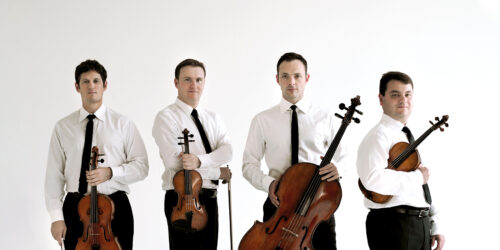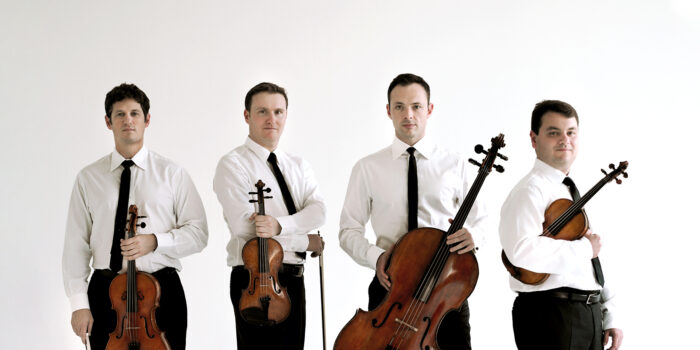 United Kingdom Beethoven: Jerusalem Quartet (Alexander Pavlovsky, Sergei Bressler [violins], Ori Kam [viola], Kyril Zlotnikov [cello]). Wigmore Hall, London, 31.3.2022. (MB)
United Kingdom Beethoven: Jerusalem Quartet (Alexander Pavlovsky, Sergei Bressler [violins], Ori Kam [viola], Kyril Zlotnikov [cello]). Wigmore Hall, London, 31.3.2022. (MB)

Beethoven – String Quartet No.3 in D major, Op.18 No.3; String Quartet no.9 in C major, Op.59 No.3, ‘Razumovsky’; String Quartet No.14 in C-sharp minor, Op.131
Half-way through the Jerusalem Quartet’s survey of the (canonical) Beethoven string quartets, and there was no sign of flagging, whether from players or audience. The performances we heard at the Wigmore Hall were as full of energy as ever, even arguably on occasion (as in the finale to the third Razumovsky Quartet) to excess. One can, of course, argue about this or that interpretative choice. No single set of performances will please everyone all the time; no single performance will, for that matter. There is no gainsaying, though, the outstanding playing, nor the sense of discovery and achievement throughout.
As with previous accounts of quartets from Op.18, the Jerusalem Quartet captured very well the post-Mozartian qualities of D major Quartet, Op.18 No.3: influence, even debt, yet also a knowledge that it is too late, even for Beethoven, to be Mozart. Their first-movement questions and responses were not only conversational, though that was a striking quality of the exposition in particular, but also teleologically directed through motivic process. An almost crazily intense development section led to the recapitulation having Beethoven’s material rise phoenix-like from the ashes left behind. All this was heard — played — as if in a single breath. Neither here nor elsewhere was there a hint of the condescension some visit on ‘early’ Beethoven. The Andante con moto was full of character, born of detail and that longer-term hearing. The harmonic role of Kyril Zlotnikov’s cello became all the more apparent here as enabler and propeller; then so too did that of the other instruments, for harmonic miracles were also effected above an unchanging bass. Once more, there was great intensity to the climax. A scherzo and trio with all the tension of a coiled spring still had space where required. Concision here was the watchword. The Presto finale proved full of incident, ever surprising. A keen sense was conveyed of the harmonic and other implications, of varying phrase length, especially prolongation. Helter-skelter, yet with ultimately disciplined freedom and once more clear sight of the goal, here was Beethoven as Haydn’s pupil.
A grave introduction to the C major ‘Razumovsky’ Quartet, Op.59 No.3, may initially have sounded a little understated, but not at all; when the exposition proper burst forth, all fell into place, a strong sense of necessity present and correct. Every note of this first movement seemed relished as if new. An almost Mendelssohn-like, elfin quality to development — not only the development section — was set in productive contrast with a dogged insistence that could only have been Beethoven’s, especially when returning us to the tonic. Likewise, no note was taken for granted in a second movement whose strangeness — cello arco almost as much as outsize pizzicato — fully registered. Flexible, yet ever coherent, this account knew where it was going; it took us there with rawness of emotion and no little charm, revealed to be two sides of that same coin of necessity. An ultimate sense of melancholy, both constructed and ‘natural’, stood not so far from Mendelssohn either. A graceful, euphonious minuet found energetic release in a still spacious yet directed trio. Was the finale, surely the fastest I have ever heard, too fast? Notes were fairly flung off all strings in a performance as hard driven as it was intense, but this, worlds away from the Beethoven of the Quartetto Italiano, was clearly how the players heard it. It worked, to evident audience delight, though nagging doubts remained on my part.
The C-sharp minor Quartet, Op.131, rightly sounded more remote in tonality, the players showing little interest in equalising their temperament for an opening that took us to another world. Neither sweetness nor harshness was smoothed over in a performance with roots — ironically? — in Bach, yet whose longing seemed to take us all the way to Wagner’s Schopenhauerian reflections. We do not usually speak nowadays of ‘pure’ or ‘absolute’ music, largely with good reason, but perhaps in such cases we should. Not that that implies a lack of emotional depth, quite the contrary, but rather the impossibility of considering, let alone expressing that other than musically. No wonder Wagner, so often the connoisseur of quartet writing, described this Adagio as ‘the saddest thing ever said in notes’. The second movement grew out of the first, rendering its transformation of mood, tonality included, all the more moving; we knew its fragility as well as its necessity. The strange recitative of the third movement was heard with a rapt sublimity and yet humanity suggestive of angels en famille rather than approaching the throne of the Almighty.
A dizzying array of procedures was perfectly moulded into a greater whole for the variations that followed. Again, words seem to fail; mine certainly have. Is this ‘difficult’ music? One could hardly argue otherwise, and yet score and performance alike drew one in to listen, cajoled and even compelled one to make an effort that was richly rewarded. The scherzo offered a heavenly wildness — or should that be a wild heavenliness? — that also spoke, however unfashionable it might be to say so, of the sheer moral goodness that lies for so many of us at the heart of Beethoven’s voice. Suffused with sadness, the sixth movement initiated the journey back to C-sharp minor, for a finale whose tragedy was rooted in experience, but not resignation. Here, once more, Beethoven spoke with, to, and for humanity, in all its fractures, hopes, and ultimate greatness.
Mark Berry
